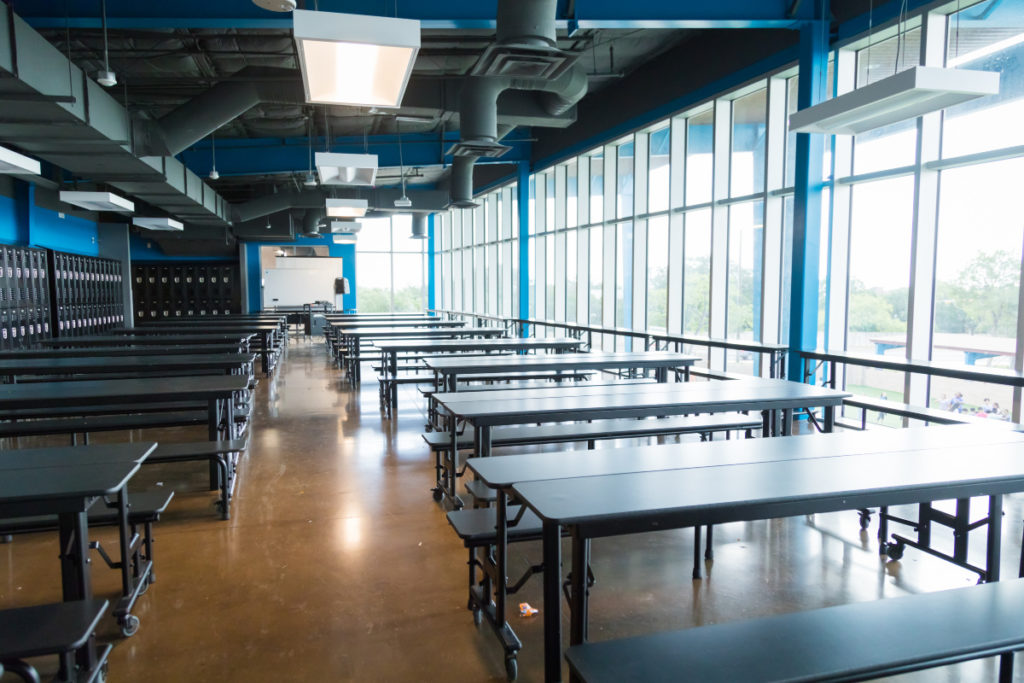Social Distancing Drives Innovation in Special Education Evaluations

Jamie Tempest requested a special education evaluation for her daughter in February. She knew her child had ADHD, and hoped that a few simple classroom accommodations would permit the first grader to excel at BASIS North Fundamental. It can exist a long procedure, but Storm had high hopes that they would have a plan in place for the beginning of second course.
The school had 45 days to comply with Storm's request to have her daughter evaluated. Before that window had passed, schools were closed. Tempest assumed that this meant their evaluation would be put on hold, that they would re-start the long process in the fall, and that her daughter would spend some other semester struggling to pay attention in course.
Social Distancing and Special Education Evaluations
March was not an like shooting fish in a barrel month for any family in San Antonio, or anywhere in the country. For some, however, the disruption caused by the COVID-19 outbreak was compounded by the abrupt halt to a disquisitional procedure: evaluation for special education services.
As districts canceled school, many as well halted the special pedagogy evaluation procedure, well-nigh of which is done in person with a specialist. This sounds like reasonable social distancing, perhaps, simply it has critical consequences for students, who will now be out until at least May four, per Governor Greg Abbott.
While districts scramble to provide altitude learning opportunities to students, families of special instruction students accept been left without clear guidance as to what comes next for them. The U.S. Department of Education and the Texas Pedagogy Agency have both issued guidance to schools, informing them that the Individuals with Disabilities Deed (Idea) applies to distance learning as well, and that all services offered to the full general population must be offered to students receiving special didactics with necessary accommodations and modification. Therapies and other services are likewise still—in theory—supposed to exist happening.
Those with existing IEPs have been told to expect while districts put plans into action. That'due south frustrating enough, parents say, simply for those without IEPs, the rest of the year could be lost, relieve what parents are able to offer at home. Speech communication therapy, occupational therapy, literacy coaching, and other targeted support will be delayed for months more than afterward what has been, for many families, a long procedure already.
AIM Offers Special Education Tele-evaluations
Not so fast (or irksome), says Susan Houser of Assessment Intervention Management (AIM), a local special education services provider. Houser and the AIM team specialize in helping families access the free and appropriate public education to which the law entitles them. Her team immediately began to pivot to make tele-evaluation a possibility not but during COVID-19, but for the future.
"There'southward great opportunity on the horizon if we tin can just get to it," Houser said.
In the best of times, communities in rural areas take a more difficult time getting high quality educational screening for a reasonable price, Houser explained. They have to either rely on what is available—normally someone who is non certified or trained for the specific screening to place learning differences—or hire someone to travel to the school from another community. The latter choice could exist cost prohibitive, Houser said, as many consultants charged for travel time, inflating the fee beyond affordability. Organizations similar AIM try to help, only they tin can only be and so many places at once. Houser said she would honey to be able to fulfill requests out of East and Westward Texas where evaluation and special educational activity services are particularly hard to come by.
Suddenly, everyone feels the pain of rural districts. With cities in lock-downwards, no one has access to an in-person evaluation. Tele-evaluations "are our but choice," Houser said. "How practice we do it with ethics and high quality?"
Partnering with Publishers and Schools for Tele-evaluations
Because remote evaluation for special education has e'er been automatically dismissed, Houser said, no one had put in the time to standardize information technology. The companies that produce the highly protected IQ and academic tests used in evaluations kept the products nether lock and key, not only for proprietary reasons, Houser explained, but to protect the integrity of the results. Protocols had not been developed to ensure the about administered tests would be as reliable as those administered in person, controlling for the necessary variables.
As a "small transport," Houser said, her team was able to pin chop-chop. Over the class of less than a month, AIM has developed a standardized tele-evaluation strategy. Houser said, "We've ever washed weird things that nobody else did. That's our niche."
They've done so with the cooperation of test publishers Pearson, WPS, and Riverside, all of whom granted permission for their materials to be used virtually by AIM facilitators. "We've never had that before," Houser said.
They then went to work creating protocols to insure the integrity of the evaluations. They reached out to the Office of Civil Rights and the Texas Education Agency to make sure that their procedures would not run afoul of regulations, and are in the process of figuring out how to deliver special educational activity services virtually as well. Therapists and teachers will need to empathise best practices, and how accommodations can be met using available engineering. Virtual services volition also create different scaling opportunities; AIM is procuring waivers to allow voice communication assistants to administer speech therapy nigh, to ease the load on therapists.
The main hurdle right now is getting districts to agree. Private families brand upwardly some of AIM'due south clientele, but their main clients are school districts and charter networks, who outsource evaluation services to AIM.
Special Teaching Evaluations Achieved
Storm got a phone call mid-March, announcing that the school would move forward with the special education evaluation. They went up to the shuttered campus, where they were given a health bank check and escorted to an empty classroom. The evaluator was in some other room, and the evaluation moved forward virtually. So far, Storm said, she's confident the new method is producing reliable results, "given the feedback from the tester so far."
Charters—like BASIS N Key, where Storm's daughter is enrolled—have begun to sign on for tele-evaluations adequately quickly. Houser attributes this to the fact that, similar AIM, they are modest ships specifically designed to operate differently from larger systems. Districts educate more students with more variables, and information technology is more hard to introduce new procedures into a large system. At the same fourth dimension, now may exist tele-evaluation'southward best shot, Houser said, considering with everyone in problem solving style, systems are beingness forced to innovate in every realm, including special education.
Houser is convinced that once tele-evaluation and consultation has proven constructive, the alter will pay off big time for districts.
Not every evaluation and service can be delivered remotely, Houser explained, but if some can, it frees up on-site providers for those that can't. Districts still have plenty of special education services to figure out during the COVID-nineteen crisis, but Houser is hoping that this is both a burden eased and a lesson learned.

Charter Moms Chats
Watch Inga Cotton'southward interview with Bekah McNeel on Charter Moms Chats.
Almost the Writer
Bekah McNeel is a San Antonio-based education writer who focuses on equity, innovation, and social-emotional learning for publications such as The 74. Over the years, we accept republished local education coverage from her Hall Monitor site, and concluding November she wrote for us a four-part series, "Punished, Non Served," nigh unfair discipline for students with disabilities.
Read More
- "Punished, Non Served: The Battlefield of Toileting," Bekah McNeel, San Antonio Charter Moms, November 22, 2019
- "Punished, Non Served: No One Seems to Want These Kids in Class" Bekah McNeel, San Antonio Charter Moms, November 22, 2019
- "Punished, Not Served: Kids Beingness Disciplined for Their Disabilities," Bekah McNeel, San Antonio Lease Moms, November 22, 2019
- "Punished, Not Served: Texas Information Shows Students with Certain Disabilities Are More Probable to Exist Disciplined than Served," Bekah McNeel, San Antonio Charter Moms, November 22, 2019
 Loading...
Loading...
Source: https://sachartermoms.com/special-education-evaluations-innovation/
0 Response to "Social Distancing Drives Innovation in Special Education Evaluations"
Post a Comment